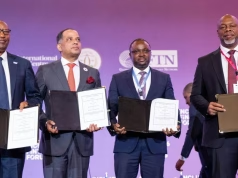In a landmark ruling, the Federal High Court in Lagos has affirmed the Federal Competition and Consumer Protection Commission’s (FCCPC) regulatory authority over competition and consumer protection in Nigeria’s telecommunications sector. The court dismissed a lawsuit filed by MTN Nigeria shareholder Emeka Nnubia, reinforcing FCCPC’s mandate to investigate anti-competitive practices and protect consumer rights across all sectors, including telecoms.
The Federal High Court in Lagos has delivered a significant ruling in favor of the Federal Competition and Consumer Protection Commission (FCCPC), affirming its regulatory authority over competition and consumer protection in the telecommunications sector. The case, presided over by Justice F.N. Ogazi, stemmed from a lawsuit filed by Emeka Nnubia, a shareholder of MTN Nigeria and a legal practitioner, who sought to prevent the FCCPC from investigating the telecom giant.
Nnubia had argued that the Nigerian Communications Commission (NCC) was the sole regulator of the telecom sector and that FCCPC’s inquiry could violate data protection laws. However, the court ruled that Section 90 of the Nigerian Communications Act (NCA) 2003, which grants the NCC jurisdiction over competition matters in telecommunications, must be read alongside Section 104 of the Federal Competition and Consumer Protection Act (FCCPA) 2018. The latter establishes the FCCPC as the primary regulatory authority on competition and consumer protection across all sectors, including telecommunications.
The court held that the FCCPA, being a later legislation, supersedes conflicting provisions of the NCA 2003 to the extent that they seek to exclude FCCPC’s oversight in the telecom industry. This ruling effectively means that the NCC does not have exclusive control over competition regulation in telecoms, and both regulators must share jurisdiction.
In its decision, the court upheld FCCPC’s right to investigate MTN for potential anti-competitive practices, stating that the commission acted within its statutory powers in issuing a summons to MTN Nigeria as part of its ongoing inquiry. The court emphasized that FCCPC’s “summons and request to produce was found to be lawful and within the scope of its investigative powers.”
The court also dismissed concerns about data protection violations, clarifying that FCCPC’s request for information from MTN did not violate any data protection laws, including the Nigeria Data Protection Act 2023 and the NCA 2003. It noted that no personal data was requested and that MTN’s obligation to disclose information in the public interest is a legitimate basis for compliance with FCCPC’s inquiry.
The ruling further reinforced the principle of regulatory independence, stating that FCCPC does not need to enter into a Memorandum of Understanding (MoU) with sector regulators before enforcing its statutory functions. Instead, it is the responsibility of sector regulators to work with the FCCPC. The court clarified, “Entering into a Memorandum of Understanding with sector regulators is not a condition precedent for FCCPC’s enforcement of its statutory functions. Instead, it is the obligation of sector regulators to engage with FCCPC to define working arrangements, not the other way round.”
The judgement also rejected any attempt to hinder FCCPC from carrying out its statutory mandate, noting that “preventing a regulator from discharging its duties violates the doctrine of separation of powers enshrined in the Constitution.” While acknowledging the public interest significance of the case, the court declined to award costs, despite noting that “costs ordinarily follow events.”
The plaintiff, Emeka Nnubia, represented himself in the case, while Mr. Abimbola Ojenike and Ms. Oluwadamilola Omotosho appeared for the FCCPC. Mr. Chinonso Ekuma represented MTN Nigeria, and notably, there was no legal representation for the first defendant, the Minister of Industry, Trade, and Investment.
This ruling marks a significant victory for the FCCPC, granting it judicial backing to continue its regulatory oversight in the telecommunications industry. It underscores the commission’s role in promoting fair competition, protecting consumer rights, and ensuring compliance with statutory obligations across all sectors.
The Federal High Court’s ruling in favor of the FCCPC represents a pivotal moment in Nigeria’s regulatory landscape. By affirming the commission’s authority over competition and consumer protection in the telecom sector, the court has reinforced the importance of a collaborative regulatory framework. This decision not only strengthens FCCPC’s mandate but also sets a precedent for enhanced consumer protection and fair market practices in Nigeria’s telecommunications industry.
Follow us on Instagram.
https://www.instagram.com/businessnewsng?igsh=ZXpweTdjOGF1ZXdu

























